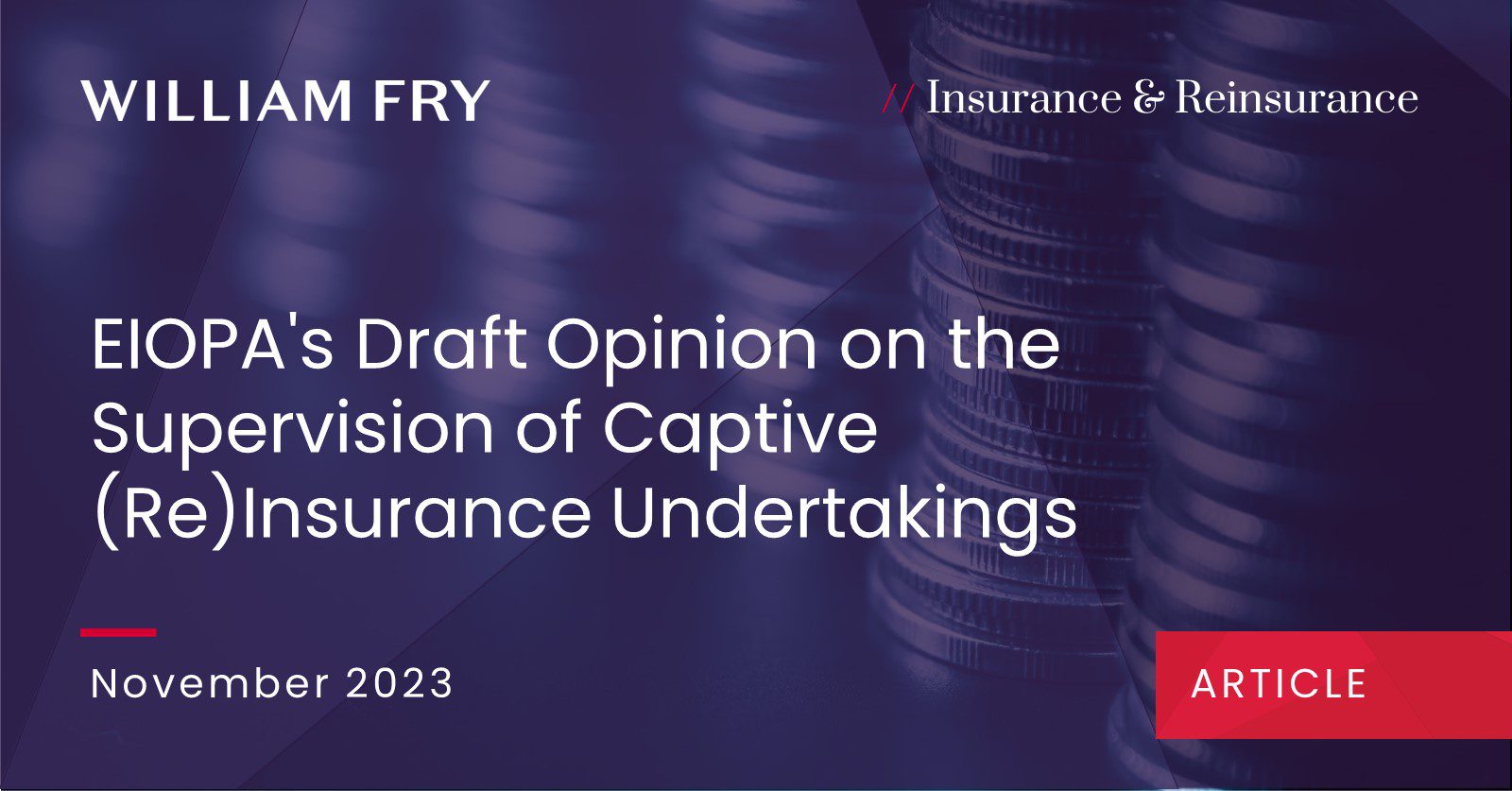On 5 October 2023, the European Insurance and Occupational Pensions Authority (EIOPA) published its draft Opinion on the Supervision of Captive Re(insurance) Undertakings (the Draft Opinion).
Addressed to National Competent Authorities (NCAs), the Draft Opinion’s stated objective is to facilitate a risk-based, proportionate and convergent supervision of captive (re)insurance undertakings (Captives) within the EU which recognises the specificity of Captives’ business models.
Intra-group transactions (cash pooling)
‘Cash pooling’ refers to an arrangement within a group designed to share liquidity among entities within that group, to optimise returns and achieve operational efficiencies. The Draft Opinion identifies two main types of cash pooling arrangements, namely physical and notional cash pooling. In ‘physical cash pooling’, all accounts represent a resource or an obligation (i.e. legal relationship) between a bank and the entities that participate in the pool and the surplus liquidity from the individual accounts (including the Captives’) is transferred to the master account giving rise to an inter-company transaction of the same amount. Whereas, with ‘notional cash pooling’, the pooling is performed by the entity/bank creating a notional top account that virtually consolidates the positions of the pool participants but does not itself represent a resource or an obligation of the bank. The Draft Opinion emphasises that the Solvency Capital Requirement (SCR) calculation in respect of any cash pooling arrangement must follow the economic and legal substance.
Although the Draft Opinion recognises that ‘cash pooling’ can bring many benefits to an entity’s wider group (such as reducing the entity’s recourse to external financing), there are several risks associated with it, including that of pool members not receiving remuneration in keeping with arm’s length interest rates and a risk of contagion effects between the parent company and Captives where the financial situation of the parent deteriorates. The Draft Opinion emphasises that NCAs should ensure that where there is material reliance on these types of transactions, this should be reflected in the Own Risk and Solvency Assessment, and the availability of funds in a cash pooling should be tested under a stress scenario. Additionally, limits should be set by the group concerning assets held to cover liabilities towards policyholders.
Elsewhere, the Draft Opinion affirms that NCAs should ensure that Captives recognise and classify in the Solvency II Balance Sheet the asset and liability descriptions according to the economic substance of the cash pooling arrangement and apply the proper calculation of the SCR. If the classification of an asset under the cash pooling arrangement is as a loan, then the asset needs to be taken into account in the relevant Market Risk submodules, including spread risk and concentration risk. If the classification of an asset under the cash pooling arrangement is not as a loan and the asset can be classified as cash at bank, then the asset needs to be taken into account in the Counterparty Default risk module. NCAs should ensure that undertakings in the classification consider characteristics such as the immediate availability of the asset and consider situations of deterioration of financial conditions of the counterparty of Captives. Fundamentally, NCAs should ensure that there is no arbitrage in the classification of the asset as a loan or not.
Additionally, the Draft Opinion highlights the Standard Formula SCR calculation of counterparty default risk (which applies only if the arrangement is not classified as a loan) where the cash pooling arrangement is with an unrated intra-group entity. In this instance, the probability of default of that counterparty is to be calculated based on the ‘unrated’ credit exposure and cannot automatically be based on the rating of the parent company of the group to which the captive belongs. The rating of the parent company can only be used where a letter of credit, a guarantee or an equivalent arrangement is provided by the parent.
Application of the ‘prudent person principle’
The Draft Opinion mandates that NCAs examine Captives’ compliance with the ‘Prudent Person Principle’ by investigating:
- that the exposure (in terms of amount and number of counterparts) provides an adequate level of security and quality considering the portfolio as a whole;
- with regard to cash pooling arrangements, the duration of the arrangements, (including the time needed to convert the assets into cash, taking into account the conditions on any time limitations on withdrawal agreed in the arrangement and the captive liquidity plans, if applicable);
- the profitability of cash pooling arrangements taking into account prevailing macro-economic conditions and the expectation that cash pool members will earn higher interest rates thanks to better use of centralised resources;
- asset-liability matching, considering any specific rules described in cash pooling arrangements;
- whether the best interests of policyholders have been appropriately considered, which may involve establishing the arm’s length price of cash pooling transactions; and
- whether the degree of portfolio diversification is adequate considering the risk profile of the undertaking [diversification should be assessed having regard to the exposure to asset type, issuer/counterparty, issuer/counterparty group, currency, country and sector].
Additionally, NCAs should ensure that:
- Captives can promptly provide information about cash pool arrangements in sufficient detail to clearly identify the related asset classification and the legal basis of the arrangement;
- material amendments to existing material cash pooling arrangements are submitted to NCAs by Captives without delay; and
- Captives can provide evidence supporting the arm’s length price of cash pooling transactions (in collaboration with the statutory auditor, if needed), especially if amendments to cash pooling arrangements impact the asset classification.
Governance-related aspects in connection with key functions and outsourcing requirements
The Draft Opinion states that NCAs should ensure that the Administrative, Management, Supervisory Board (AMSB) (which, in an Irish context, will mean the Board of Directors) as a whole possesses the necessary seniority, qualifications, competency, skills and professional experience, with Captives not exempt from this requirement.
In relation to the outsourcing by Captives of key functions, NCAs should ensure that:
- the outsourcing arrangements comply with Article 49 of the Solvency II Directive and Guideline 14 of the EIOPA System of Governance Guidelines;
- Captives have designated a fit and proper person with responsibility for the outsourced key function who possesses sufficient knowledge to challenge the performance and results of the service provider. The Draft Opinion envisages three possibilities for this person:
- a person having an employment contract with the captive (re)insurance undertaking;
- a person under NCA supervision regardless of the employee status within the captive undertaking having a link to the undertaking via its membership in a dedicated committee set up specifically by the undertaking and dealing only with the matters of that undertaking;
- a person employed by a company that belongs to the same group as the captive (re)insurance undertaking, provided this role is properly documented within the outsourcing arrangements and fitness and propriety process
- adequate safeguards are in place to mitigate any conflicts of interest or operational risk arising from such outsourcing;
- in cases of the same service provider providing other services as well as captive management, the segregation of duties is clearly agreed upon and documented; and
- Captives undertake stringent initial and ongoing due diligence on the service provider with such processes available to the NCA upon request.
Stakeholders are invited to provide their feedback on the Draft Opinion via the online survey by 05 January 2024.
William Fry Commentary
EIOPA’s Draft Opinion is unlikely to create any particular new issues for the Captive (Re)Insurance sector in Ireland as the matters covered therein are essentially consistent with the existing supervisory approach of the Central Bank of Ireland. Indeed, the implementation of the Draft Opinion may help to level the playing field by raising the standards expected of Captives authorised in other Member States.
If you have any questions on an item(s) covered in this article, please contact any member of the William Fry Insurance Team or your usual William Fry contact.
Contributed by Mike Frazer and Jack Stokes




